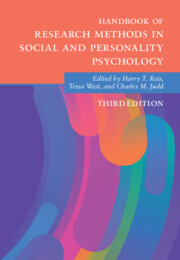Book contents
- Handbook of Research Methods in Social and Personality Psychology
- Cambridge Handbooks in Psychology
- Handbook of Research Methods in Social and Personality Psychology
- Copyright page
- Contents
- Figures
- Tables
- Contributors
- Introduction
- 1 The Romance of Research Methods
- Part I Before You Dive In
- Part II Basic Design Considerations to Know, No Matter What Your Research Is About
- Part III Deep Dives on Methods and Tools for Testing Your Question of Interest
- Part IV Understanding What Your Data Are Telling You About Psychological Processes
- 20 Measurement
- 21 Advanced Psychometrics
- 22 Dealing with Repeated Measures
- 23 The Design and Analysis of Data from Dyads and Groups
- 24 Random Factors and Research Generalization
- 25 Combining Statistical and Causal Mediation Analysis
- 26 Mathematical and Computational Models
- 27 Meta-analysis
- Index
- References
21 - Advanced Psychometrics
from Part IV - Understanding What Your Data Are Telling You About Psychological Processes
Published online by Cambridge University Press: 12 December 2024
- Handbook of Research Methods in Social and Personality Psychology
- Cambridge Handbooks in Psychology
- Handbook of Research Methods in Social and Personality Psychology
- Copyright page
- Contents
- Figures
- Tables
- Contributors
- Introduction
- 1 The Romance of Research Methods
- Part I Before You Dive In
- Part II Basic Design Considerations to Know, No Matter What Your Research Is About
- Part III Deep Dives on Methods and Tools for Testing Your Question of Interest
- Part IV Understanding What Your Data Are Telling You About Psychological Processes
- 20 Measurement
- 21 Advanced Psychometrics
- 22 Dealing with Repeated Measures
- 23 The Design and Analysis of Data from Dyads and Groups
- 24 Random Factors and Research Generalization
- 25 Combining Statistical and Causal Mediation Analysis
- 26 Mathematical and Computational Models
- 27 Meta-analysis
- Index
- References
Summary
In this chapter we review advanced psychometric methods for examining the validity of self-report measures of attitudes, beliefs, personality style, and other social psychological and personality constructs that rely on introspection. The methods include confirmatory-factor analysis to examine whether measurements can be interpreted as meaningful continua, and measurement invariance analysis to examine whether items are answered the same way in different groups of people. We illustrate the methods using a measure of individual differences in openness to political pluralism, which includes four conceptual facets. To understand how the facets relate to the overall dimension of openness to political pluralism, we compare a second-order factor model and a bifactor model. We also check to see whether the psychometric patterns of item responses are the same for males and females. These psychometric methods can both document the quality of obtained measurements and inform theorists about nuances of their constructs.
Keywords
- Type
- Chapter
- Information
- Publisher: Cambridge University PressPrint publication year: 2024

